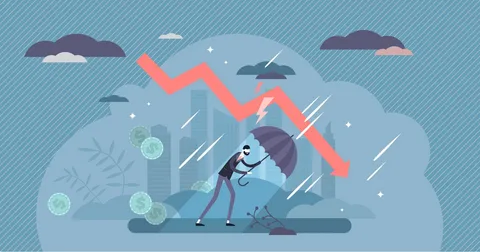How to Stay Calm During a Stock Market Drop
Volatility in the market is common when you invest funds. In times of quick price changes, many investors become filled with uncertainty, concern, or even worry. Any drop in the market, big or small, might cause some to make financial decisions they will later wish they hadn’t. Knowing how to remain calm in a stock market dip is very important to achieve good results over the long run. Not losing your calm can help ensure your finances go the right way rather than the wrong way in a panicked moment.
Understanding Market Volatility
Stock markets are always subject to sharp fluctuations. Economic, corporate, political, and investor factors can change the industry’s prices. Changes in investments are a usual part of investing. Being prepared for market volatility means you’re less startled when prices fall.

Remember, if there’s a market drop, it’s nothing new and always happens. It can feel severe when front-page stories focus on significant losses, but chances are it won’t last long. In previous times, markets have rebounded and developed more strongly as time passed. Seeing this pattern provides comfort when everything starts to feel confusing.
Focus on the Long-Term Perspective
During market downturns, people often become very short-sighted. If you see charts turn red, read about alarming news, and notice your portfolio shrinking, these can cause stress. However, those who succeed as investors remain patient by concentrating on the future.
Investing is not decided by what happens over one day, week, or month. The success of your portfolio comes from its gains over many years. Knowing your long-term plan can help you stay on track in turbulent situations. You made your investment strategy choice for a good reason. Believing in your strategy will help you stay focused as fear grows.
Limit Exposure to Financial News
Limiting the amount of market news you get can help you remain calm during stock market declines. Seeing a lot of explosions and overt opinions in the media can lead to higher anxiety. When something causes panic, the media is sure to notice.
You might find it better to look at the latest market information just once per day or every few days rather than updating news feeds very often. Find out about these things, but don’t let them stress you out. If there’s less noise, it’s easier for your mind to be clear. Find information that is grounded in truth, not whipped up with fear.
Review Your Financial Goals
All investments exist for a specific reason. Whether you are investing in a home, retirement, or another purpose, focusing on that can calm you if the market changes. When the market drops, look back at your goals. Have any financial changes occurred lately that need you to reconsider your strategy?

If you say no, your goals stay in place. Volatile market conditions shouldn’t change your long-term plans. If you decide based on your targets and not what’s happening in the market, you will likely stay calm and focused.
Avoid Emotional Decision-Making
Panic-selling your stocks is a common mistake in tough market conditions. When afraid, an urge to get out can mean we fail to improve. Many people decide to sell at the bottom, regret their actions, and feel bad when markets recover.
To stay calm in the market, you must know what sets off your emotions. If you notice you’re anxious, try to relax for a moment. Don’t change your design until you’ve finished the primary sketches. Delay your decision for a while. Talk about your financial goals with a professional. A calm mind helps you make better decisions.
Revisit Historical Market Data
Studying events from the past can give you insight during a recession. The market has recovered in many crashes, economic recessions, pandemics, and crises. A look at old charts reveals that the market has remained strong through many decades.
Both the great financial crisis of 2008 and the pandemic in 2020 did not stop markets from picking up and growing over time. Such patterns show investors that dips will always improve over time. Knowing market history makes us feel steadier when faced with uncertainties.
Lean on a Diversified Portfolio
Diversifying your portfolio is among the strongest defenses against market changes. When investments are put into different sectors, classes, and markets, one asset’s decline isn’t as harmful to your overall wealth. Having a diverse portfolio helps protect you from financial trouble.
Feeling safe in your investment comes from knowing your portfolio is secure. You don’t need to know when a specific sector will go up or down. Since your diversification strategy covers these changes, you are less likely to become rattled and more ready to stay focused and calm.
Reframe the Situation as a Buying Opportunity
When many fear a downturn, smart investors usually look for interesting possibilities. When stock prices drop, it might be a good time to get shares of great companies whose fundamentals remain strong. Market drops shouldn’t be seen as risks but as possible opportunities.
Rethinking your habits helps lower anxiety. Instead of being afraid of a downturn, use it as an opportunity to improve your investment portfolio. If you have some extra money or plans for future investments, now might be the time to consider them, but not before you analyze and align them with your goals.
Maintain Regular Investment Habits
During uncertain times, consistency matters a lot. Following dollar-cost averaging, investors keep buying stocks for the same amount and time. With this approach, you can purchase a greater number of shares when their price is down and a smaller number when it’s up, which helps you keep your average cost stable.
If you do not change your plan, you don’t feel the pressure of guessing when to invest. Regular habits protect you from the tornado of feelings that can come with the ups and downs in the market. They show you that a single loss doesn’t determine the success of your investments.
Talk to a Financial Advisor or Peer
In some cases, feeling reassured is the result of a close bond. Getting feedback from someone you trust or discussing with experienced investors can put your worries into perspective. Advisors provide an outside perspective, remind you about your strategy, and help determine if an adjustment is needed.
Having friends around can help you realize that feeling unsure is normal. Listening to others helps you feel connected, and seeing their stability can reassure you.
Strengthen Your Emotional Resilience
Being an investor requires strong nerves, just as much as it does money skills. Getting stronger emotionally by practicing mindfulness, writing in a journal, or being physically active can help you remain focused when things are disrupted outside. If your mind is calm, your decisions tend to be more logical.
As soon as the market starts to cause concern, try calming yourself by stepping away from the screens. Walking, meditating, or hanging out with people you love helps you relax and think clearly. Eventually, this inner calm helps you make wise decisions when investing.
Remind Yourself Why Panic Doesn’t Pay
Finally, being calm during a dip in the stock market comes from recognizing the price we’d pay for panicking. Experts say that people who attempt to follow the market’s highs and lows usually do worse than those who stick with their investments. Falling behind on just a small number of the best market days (commonly occurring during worst declines) can seriously cut into the returns an investor receives.
I found your investment strategy based on the belief that markets are efficient. Not reacting quickly and relying on your strategy works better than switching your approach on the spur of the moment. If you’re unsure, remember that successful investors stick with it through ups and downs.
Conclusion
Now and then, there will be market drops. It doesn’t matter how hard you hit the ground; what counts is your reaction. Calmness in a falling stock market will help you keep your strategy, prevent serious errors, and continue working toward what you want financially.
Using long-term thinking, avoiding excessive media news, rereading your goals, and strengthening your emotional control allows you to be calm when markets move. Coping with stressful times is what turns investors into professionals over time.
A market drop allows you to purchase at a better price and learn more. The next time fear takes over, remind yourself that being calm will be your greatest asset. Every day, make a point to practice managing both the highs and lows in the markets.



